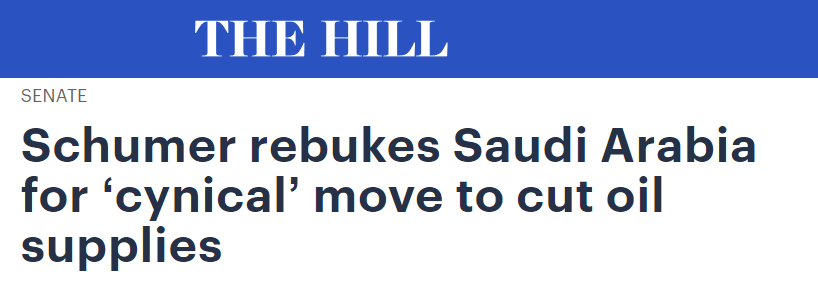China Daily, October 10Electric Nippon OPEC(OPEC) and non-OPEC producers“OPEC +On the 5th, on the occasion of the 33rd ministerial meeting, it was decided to reduce the total oil production by an average of 2 million barrels per day (2mb / d) starting from November 2022. This reduction in production is equivalent to about 2 % of World Oil Demand On the same day, the US Department of Energy, under the direction of US President Joe Biden, will supply the market with an additional 10 million barrels of oil from the Strategic Petroleum Reserve next month, he said. the White House in a note.
The European branch of the China Daily reported on the 7th that with only one month left before the US midterm elections, high inflation and soaring energy prices are sensitive issues for the American public. In this regard, CNN and other foreign media have said that the price of gasoline in the United States has recently started to rise again, posing a political risk that the White House is trying to avoid. US government officials are considering possible measures. Senate Majority Leader Schumer even further said the move has put more pressure on the US economy and they will pay for it.
CNN: Biden administration put pressure on OPEC + production cuts The White House experiences “spasms and panic”
CNN cited several sources who claimed on the 4th that the Biden administration had previously launched a global pressure campaign to try to stop the Middle East from reducing oil production at the last minute. But that effort appears to have failed, and the OPEC + move, in turn, could lead to a rise in U.S. gasoline prices at a time of uncertainty for a Biden administration, with mid-term elections only a month away. of distance.

US President Biden told CNN on 5th local time that he was “concerned” about the production cuts, which he considered “unnecessary”. “When it comes to OPEC, we have clarified our views to OPEC members,” US Secretary of State Blinken told reporters when asked about the move. Another US official said the White House was “in spasm and panic”, describing the administration’s latest effort as “taking off the gloves.”
For a Biden administration, deep cuts in oil production come at a bad time. For months, the Biden administration has been engaged in intense US domestic and foreign policy efforts to alleviate the surge in energy prices in the wake of the Russia-Ukraine conflict. But with the crucial mid-term elections a month away, US gasoline prices have started to rise again, posing a political risk that the White House is trying to avoid. US officials have been weighing possible measures to stem a gradual rise in oil prices in recent weeks, with the OPEC + move posing a particularly daunting challenge for the US.
United States President Joe Biden met Crown Prince and Prime Minister of Saudi Arabia Mohammed bin Salman three months ago as part of the trip in hopes of persuading Saudi Arabia to increase oil production, which would help make drop the price of gasoline in the US at that time.
“Washington Post”: “OPEC +” production cut is a “major failure” of the US government, and it is unwise to free up the strategic oil reserve
For President Biden’s attempt to persuade the Saudi Arabian government to help US energy policy, the Washington Post bluntly called the US government a “major failure.”
The article states, “OPEC+ “The production cut is a setback to the Biden administration’s foreign policy and a major blow to the United States and its allies in multiple ways.
It is also unwise for the US to release further oil from the Strategic Petroleum Reserve, which is already at its lowest level since the mid-1980s.
“Capitol Hill”: Senate Majority Leader Schumer said it will bring more pressure on the US economy they will pay
Senate Majority Leader Charles Schumer said Saudi Arabia’s support for a 2 million barrels per day cut in oil supply would put more pressure on the US economy. “We are reviewing all legislation to best address this behavior, including the NOPEC bill,” Schumer said in a statement.

In May, the Senate Judicial Commission passed the Anti-Oil Production and Export Monopoly Act, which would amend existing laws and expose OPEC + members and their oil companies to lawsuits. The bill would allow the Justice Department to sue OPEC nations, which own and control oil companies, for setting prices in US courts and then seizing foreign property in the US to pay for the resulting losses.
According to NPR, some 2,700 US personnel are deployed to Saudi Arabia to protect their interests, according to a recent White House report to Congress.
(Compiler: Ma Rui Publisher: Han He)
[Direttore responsabile: Ma Rui]
![[Il mondo dice]Foreign media: ‘OPEC +’ decision to cut White House production is experiencing ‘spasms and panic’ – Chinadaily.com.cn [Il mondo dice]Foreign media: ‘OPEC +’ decision to cut White House production is experiencing ‘spasms and panic’ – Chinadaily.com.cn](http://img3.chinadaily.com.cn/images/202210/10/6343cd06a310817f5c115d97.jpeg)

